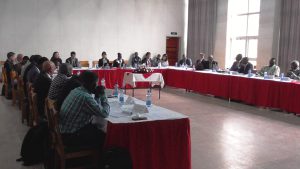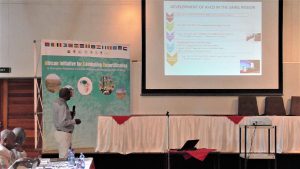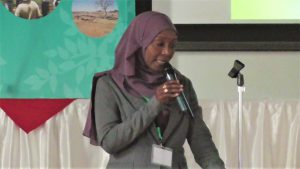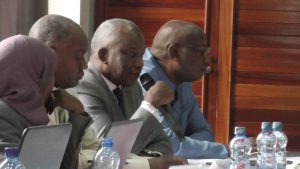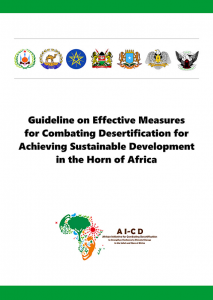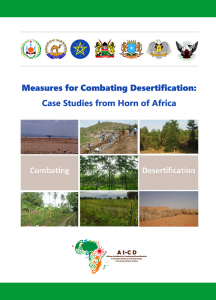Overview
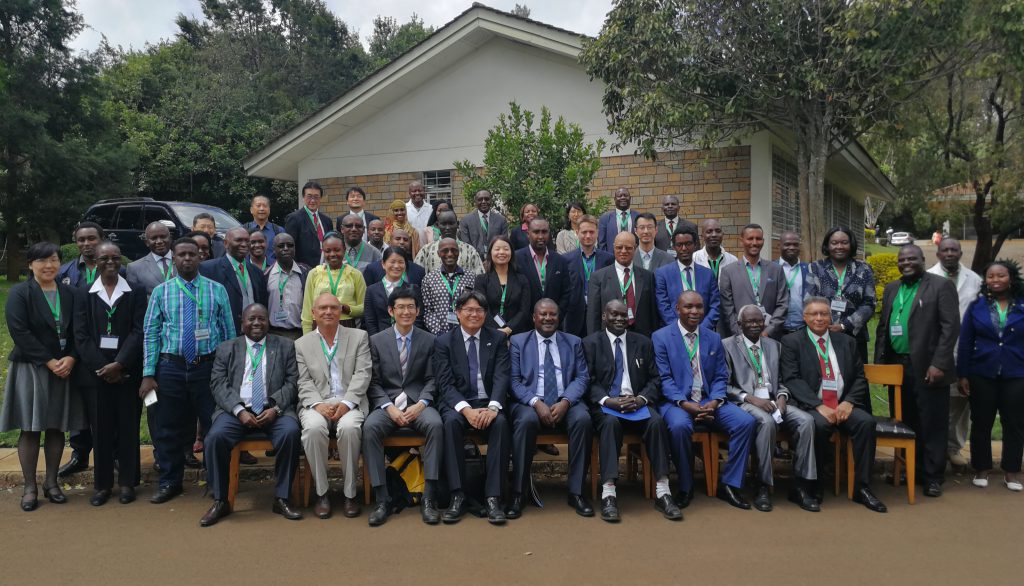
The 3rd Regional Forum for Horn of Africa on African Initiative for Combating Desertification to Strengthen Resilience to Climate Change in the Sahel and Horn of Africa (AI-CD) was held from 14th to 16th of May 2019 in Nairobi, Kenya. It particularly focused on access to finance for promoting policy implementation in combating desertification by AI-CD participating countries.
Around 60 participants from six countries in the Horn of Africa region attended (i.e., Djibouti, Eritrea, Kenya, Somalia, South Sudan and Sudan) along with representatives of international agencies, namely: Japan International Cooperation Agency (JICA), Food and Agriculture Organization (FAO), African Development Bank (AfDB), and United Nations Development Programme (UNDP).
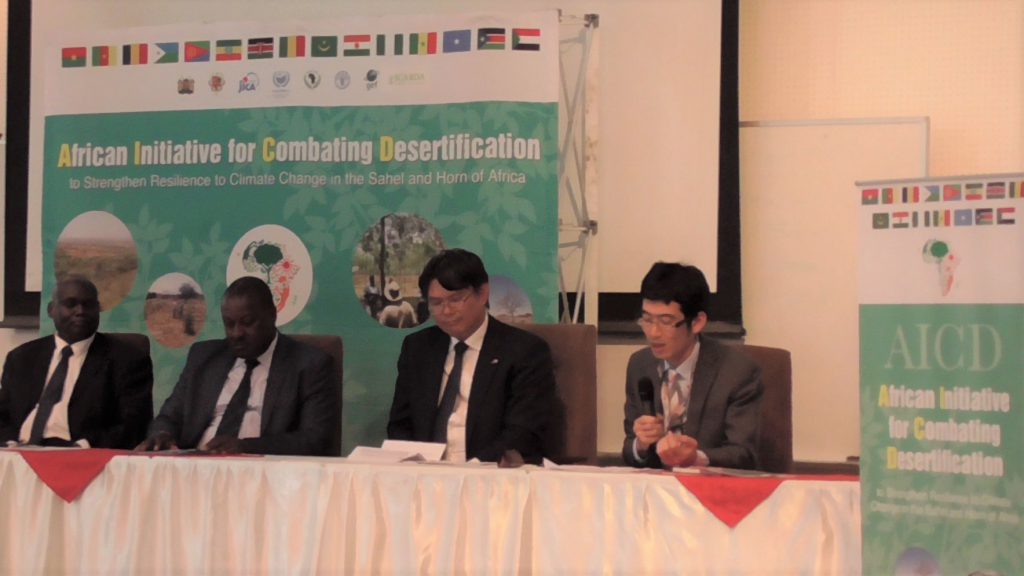
The opening ceremony was chaired by Dr. Cheboiwo, the Director of Kenya Forestry Research Institute (KEFRI). Mr. Komori, Chief Representative of JICA Kenya Office, expressed gratitude for the participation in the forum, stressed the importance of financial access to translate ideas into actions, and hoped for the success of the forum. For his part, Mr. Shigefuji, the First Secretary of the Embassy of Japan in Kenya, emphasised his expectation that the forum shall create an action on the ground through AI-CD which will contribute in achieving the Sustainable Development Goals. Mr. Obino, Director of Administration of the Ministry of Environment and Forestry, Kenya gave a warm welcome to all attendees and encouraged them to share each other’s knowledge and deliver it to the communities to facilitate natural resource conservation.
Highlights of the forum
(1) Introduction and progress on AI-CD implementation
- Participants of AI-CD’s 3rd Regional Forum
- Representative from Senegal presenting AI-CD progress in the Sahel region
To start off, the objective of the forum was presented. Then KEFRI led in the recapitulation of the AI-CD’s Terms of Reference and reported the progress on AI-CD implementation in the Horn of Africa region, focusing on the collection, accumulation and sharing of good practices in the region under the Capacity Development Project for Sustainable Forest Management (CADEP-SFM)*.
A representative from Senegal shared the progress on AI-CD implementation in the Sahel region, along with the three pillars of AI-CD activities: building a network, knowledge sharing and access to finance.
As one of the AI-CD organisers, JICA reported its progress as well as Japan’s contribution to the AI-CD, and presented a newly developed technology for sand and dust storm (SDS) forecasting called SPRINTARS. Then the AI-CD Secretariat introduced the general information on fund resources, such as Global Environment Facility (GEF) and Green Climate Fund (GCF), and the country strategies of World Bank and African Development Bank. In addition, potential financial opportunities from Japan that can contribute in addressing desertification issues were presented. Moreover, the launch of the new knowledge sharing platform in collaboration with International Centre for Agricultural Research in the Dry Areas (ICARDA) was announced.
(2) Donor presentations for resource mobilisation
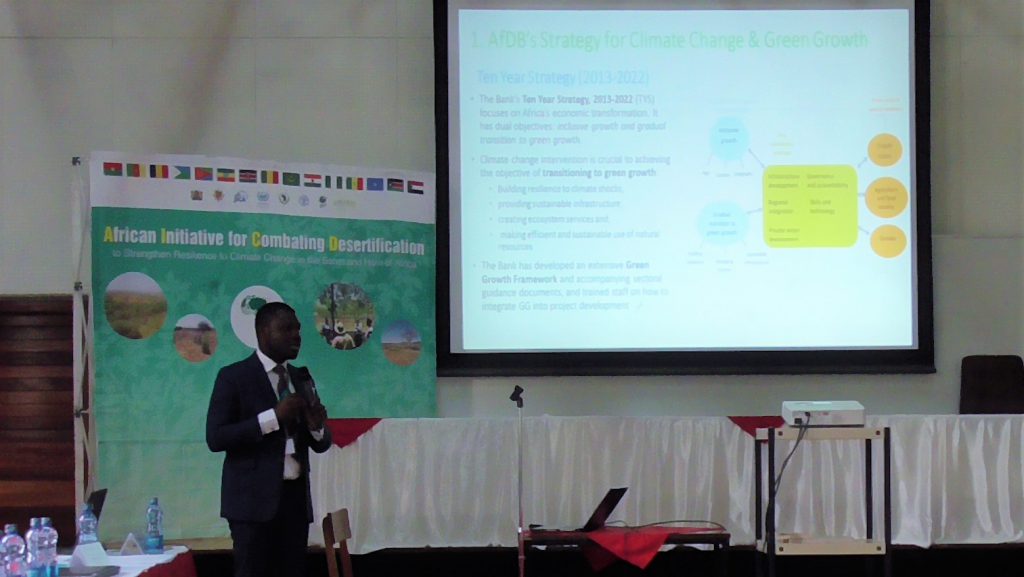
AfDB representative explaining funding options
AfDB presented its funding options to act against climate change and project examples that it has supported. For its part, UNDP delivered a project idea about global scenarios on land use change that it has been developing. Lastly, FAO explained the detailed process to apply for GCF and project examples that it is implementing with support from GCF.
(3) Country presentations and discussions for resource mobilisation
- Representative from Sudan explaining project concept note
- A participant raising a question on project concept note
All the country representatives presented project concept notes that can contribute to combat desertification in their respective countries. The concept notes were born from the problems they faced and these included activity plans, expected outcomes, and budget to implement certain projects.
After the presentation, the participants got specific and practical advice on improving the concept notes and on applying for funding from participating donors. Aiming to succeed in accessing finance, the representatives stated their future plans to further develop the concept notes with the advice they received during the forum and from consultations with donors covering their countries.
(4) AI-CD guidelines
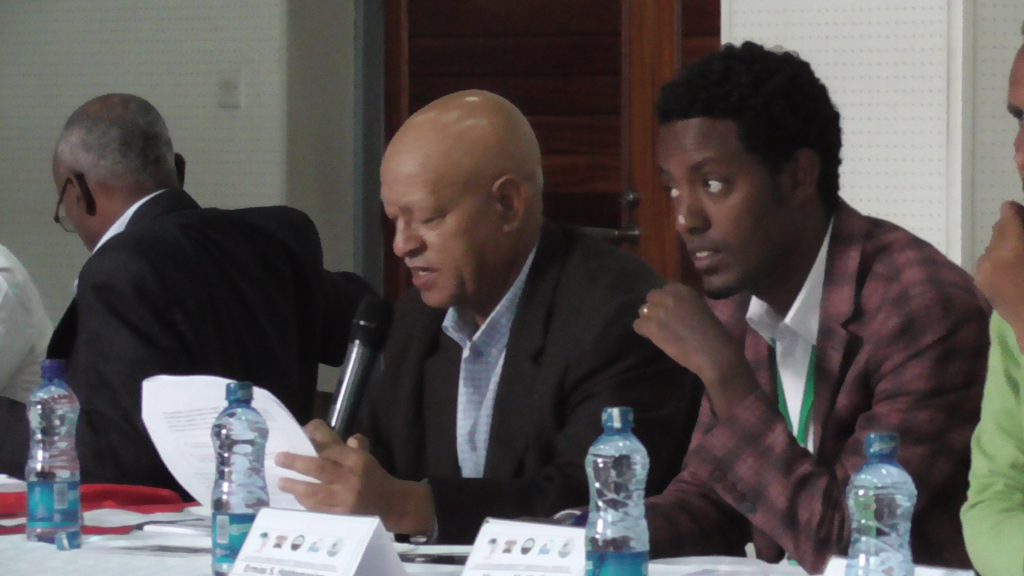
A representative from Eritrea providing a case study for the AI-CD guidelines
On the last day of the forum, the idea to develop AI-CD guidelines for effective measures in combating desertification as an output from the AI-CD in the Horn of Africa region was presented by Kenya, a co-organiser of AI-CD in the region. Kenya representative called for the opinion and good examples or case studies from each country to mainstream activities on combating desertification in policy making, institution building and implementation at local levels. Several examples were given by the participating countries which can enrich the guidelines, and they all agreed to submit case studies after the forum to help finalise these.
As highlight, the way forward was defined and the participating countries concurred with the preparation of a side event and cross-regional follow-up meeting at the 14th Meeting of the Conference of the Parties to the UN Convention to Combat Desertification (UNCCD COP14) to be held in September 2019, wherein the completed AI-CD guidelines will be launched.
(5)Exhibit and field trip
- A seedling of Melia volkensii exhibited by KEFRI
- Snacks made from local grains by using a cereal puffing machine
The exhibit showing Japanese and Kenyan products, which can contribute in combating desertification, was held on the first day. It was a first trial in an AI-CD forum. KEFRI, Meiwa Corporation and Bioversity International presented and explained their products to the participants. KEFRI displayed seeds and seedlings of Melia volkensii, an indigenous drought-torrent tree species in Kenya, and furniture made from it. Meiwa Corporation presented a biochar and wood vinegar produced by its biomass carbonisation plant, which can be used for water retention in farm soil. Bioversity International exhibited a cereal puffing machine which was produced in Kenya with technical assistance from Japan. Samples of the flavoured puffed cereal snack made from local millet and sorghum by using said machine were distributed for tasting.
- Briquettes made from charcoal dust
- An entrepreneur demonstrating how to make briquette
On the last day of the forum, the participants had a field trip and watched a local entrepreneur made briquettes from charcoal dust and wood powder. Briquette can be used as a charcoal substitute hence reducing charcoal production, which is one of the major causes of deforestation in Kenya.

